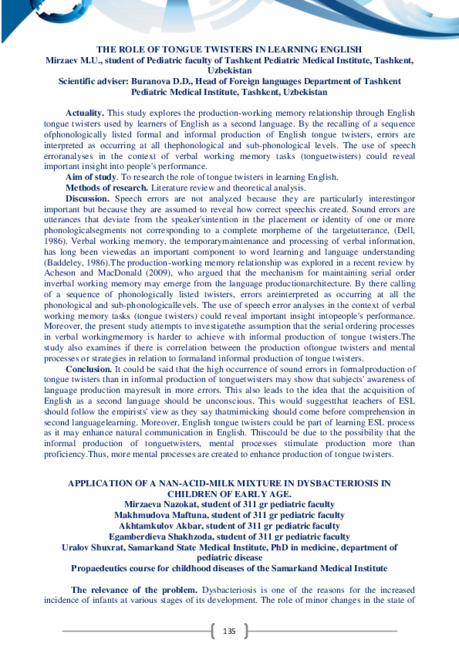
135
THE ROLE OF TONGUE TWISTERS IN LEARNING ENGLISH
Mirzaev M.U., student of Pediatric faculty of Tashkent Pediatric Medical Institute, Tashkent,
Uzbekistan
Scientific adviser: Buranova D.D., Head of Foreign languages Department of Tashkent
Pediatric Medical Institute, Tashkent, Uzbekistan
Actuality.
This study explores the production-working memory relationship through English
tongue twisters used by learners of English as a second language. By the recalling of a sequence
ofphonologically listed formal and informal production of English tongue twisters, errors are
interpreted as occurring at all thephonological and sub-phonological levels. The use of speech
erroranalyses in the context of verbal working memory tasks (tonguetwisters) could reveal
important insight into people's performance.
Aim of study
. To research the role of tongue twisters in learning English.
Methods of research.
Literature review and theoretical analysis.
Discussion.
Speech errors are not analyzed because they are particularly interestingor
important but because they are assumed to reveal how correct speechis created. Sound errors are
utterances that deviate from the speaker'sintention in the placement or identity of one or more
phonologicalsegments not corresponding to a complete morpheme of the targetutterance, (Dell,
1986). Verbal working memory, the temporarymaintenance and processing of verbal information,
has long been viewedas an important component to word learning and language understanding
(Baddeley, 1986).The production-working memory relationship was explored in a recent review by
Acheson and MacDonald (2009), who argued that the mechanism for maintaining serial order
inverbal working memory may emerge from the language productionarchitecture. By there calling
of a sequence of phonologically listed twisters, errors areinterpreted as occurring at all the
phonological and sub-phonologicallevels. The use of speech error analyses in the context of verbal
working memory tasks (tongue twisters) could reveal important insight intopeople's performance.
Moreover, the present study attempts to investigatethe assumption that the serial ordering processes
in verbal workingmemory is harder to achieve with informal production of tongue twisters.The
study also examines if there is correlation between the production oftongue twisters and mental
processes or strategies in relation to formaland informal production of tongue twisters.
Conclusion.
It could be said that the high occurrence of sound errors in formalproduction of
tongue twisters than in informal production of tonguetwisters may show that subjects' awareness of
language production mayresult in more errors. This also leads to the idea that the acquisition of
English as a second language should be unconscious. This would suggestthat teachers of ESL
should follow the empirists' view as they say thatmimicking should come before comprehension in
second languagelearning. Moreover, English tongue twisters could be part of learning ESL process
as it may enhance natural communication in English. Thiscould be due to the possibility that the
informal production of tonguetwisters, mental processes stimulate production more than
proficiency.Thus, more mental processes are created to enhance production of tongue twisters.
APPLICATION OF A NAN-ACID-MILK MIXTURE IN DYSBACTERIOSIS IN
CHILDREN OF EARLY AGE.
Mirzaeva Nazokat, student of 311 gr pediatric faculty
Makhmudova Maftuna, student of 311 gr pediatric faculty
Akhtamkulov Akbar, student of 311 gr pediatric faculty
Egamberdieva Shakhzoda, student of 311 gr pediatric faculty
Uralov Shuxrat, Samarkand State Medical Institute, PhD in medicine, department of
pediatric disease
Propaedeutics course for childhood diseases of the Samarkand Medical Institute
The relevance of the problem.
Dysbacteriosis is one of the reasons for the increased
incidence of infants at various stages of its development. The role of minor changes in the state of






